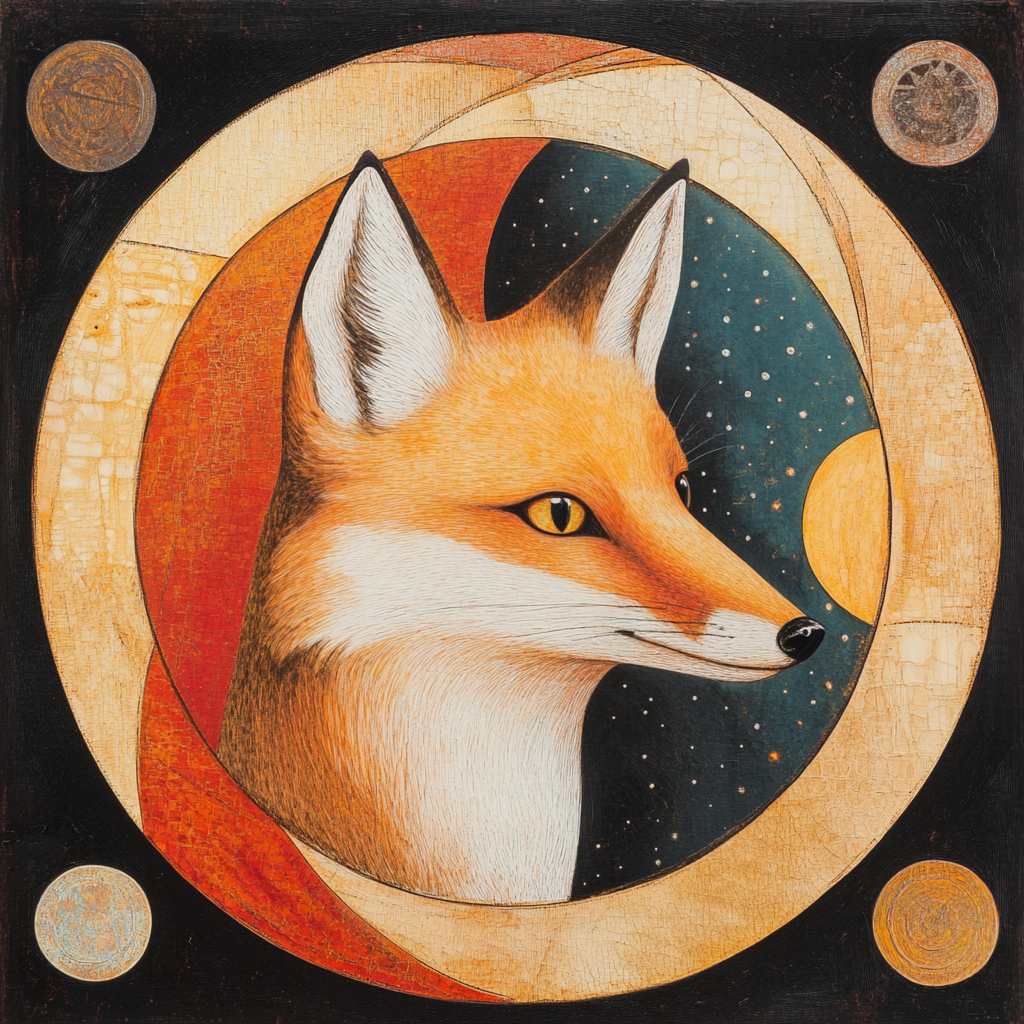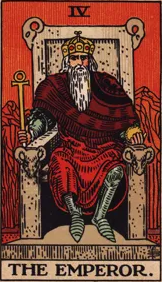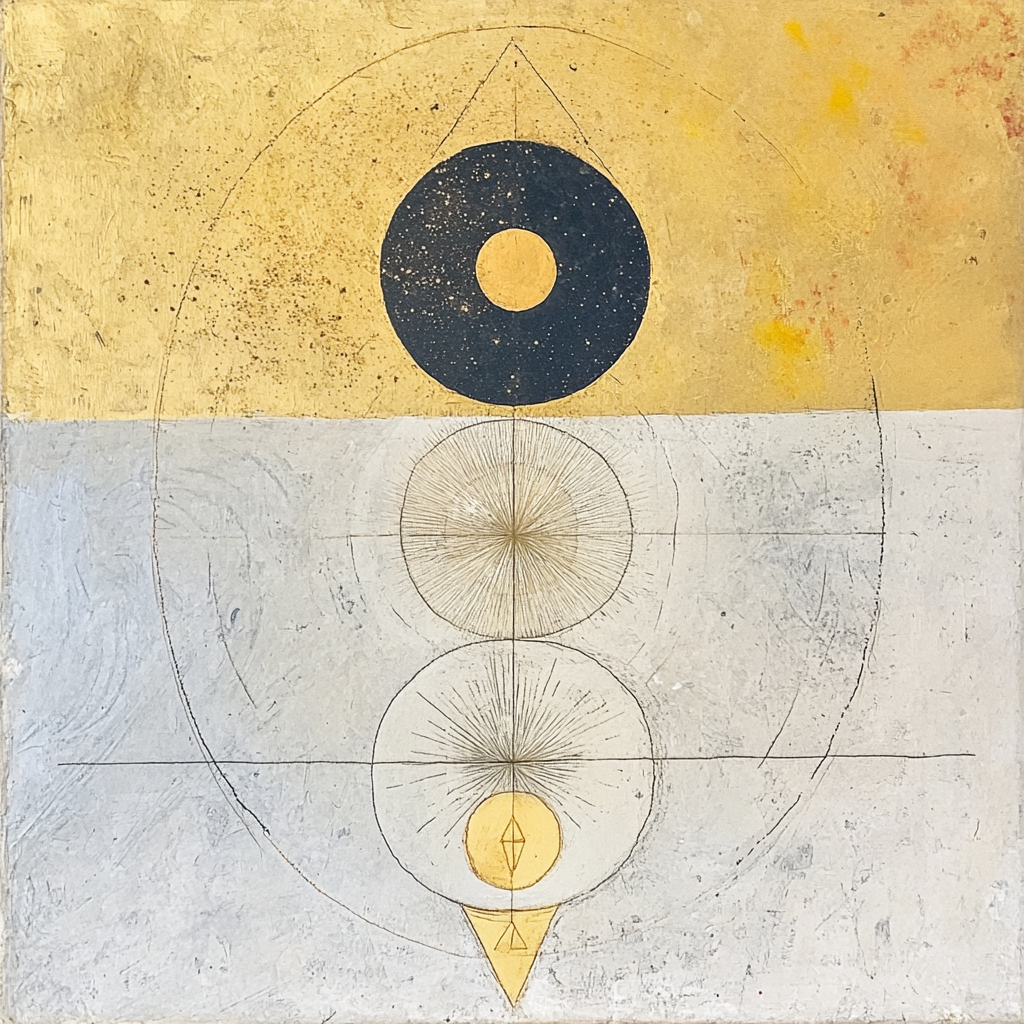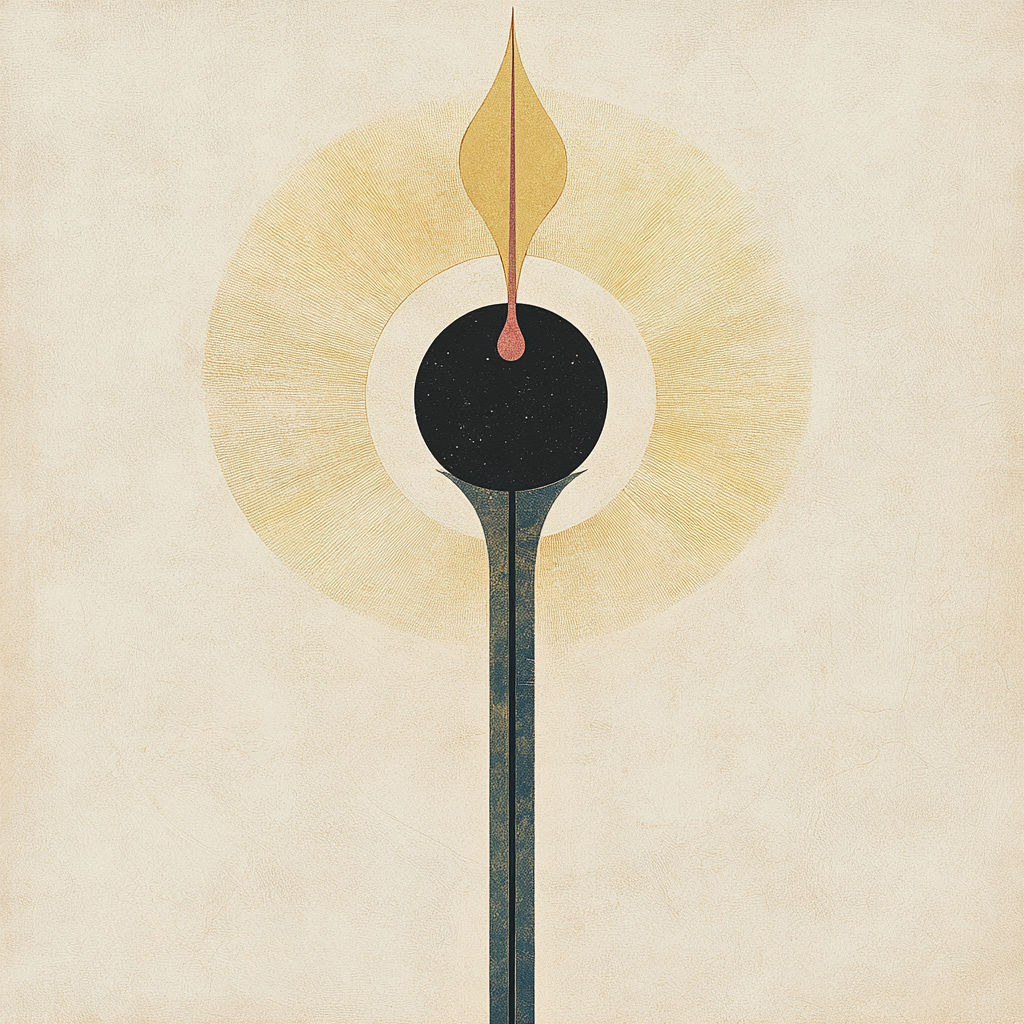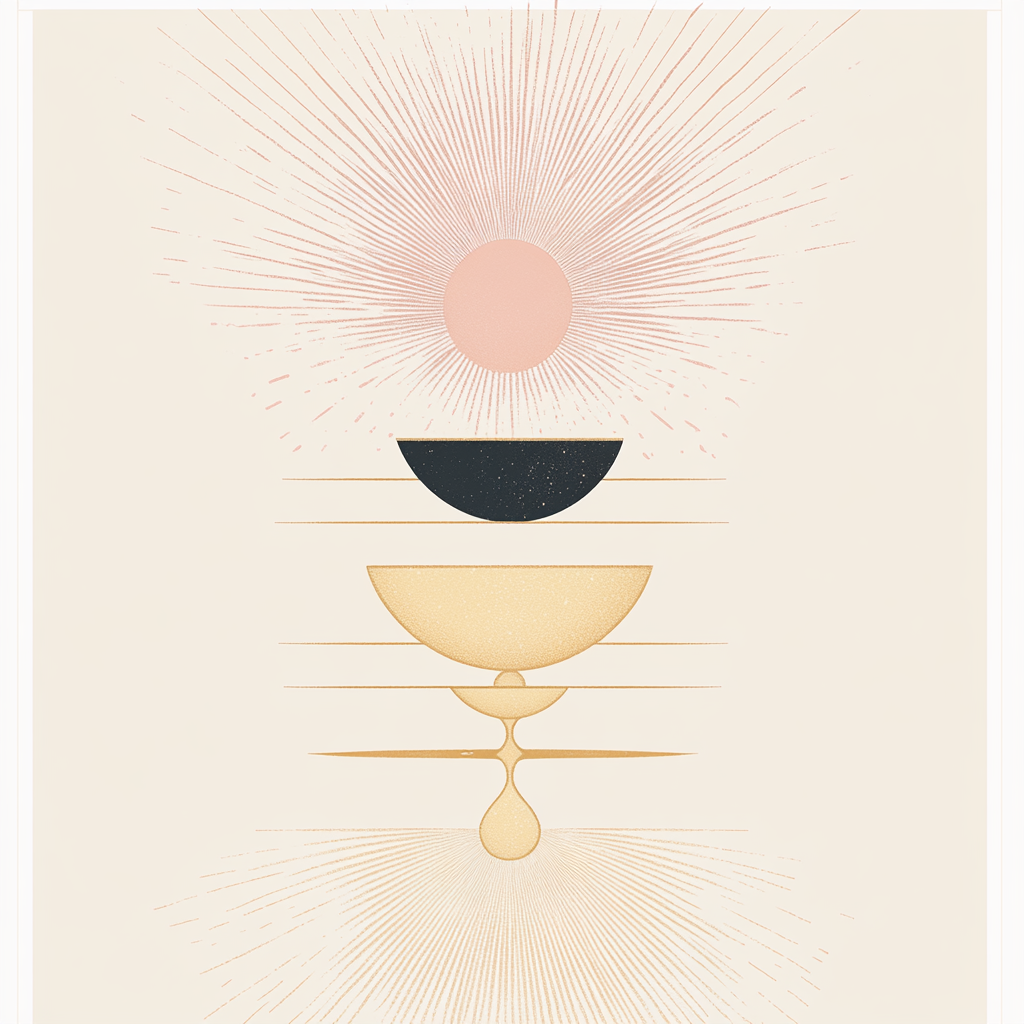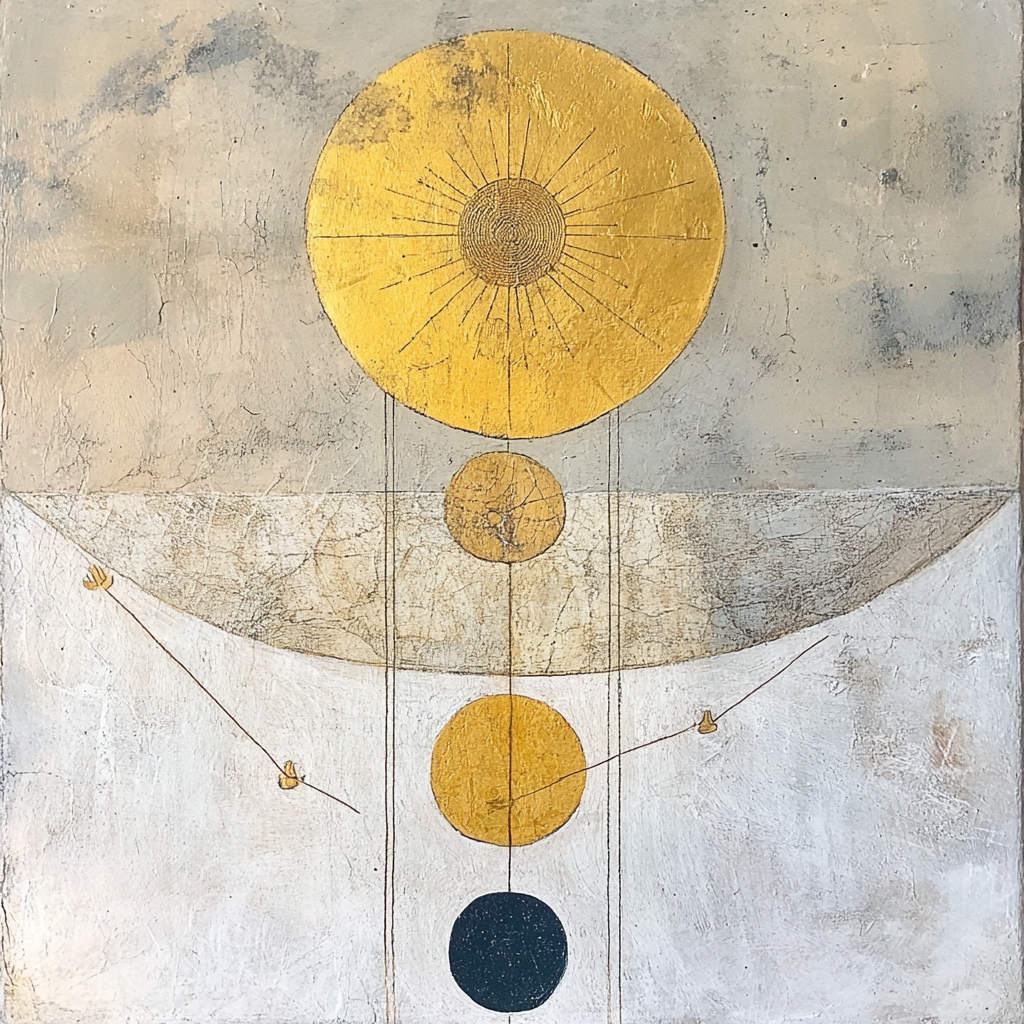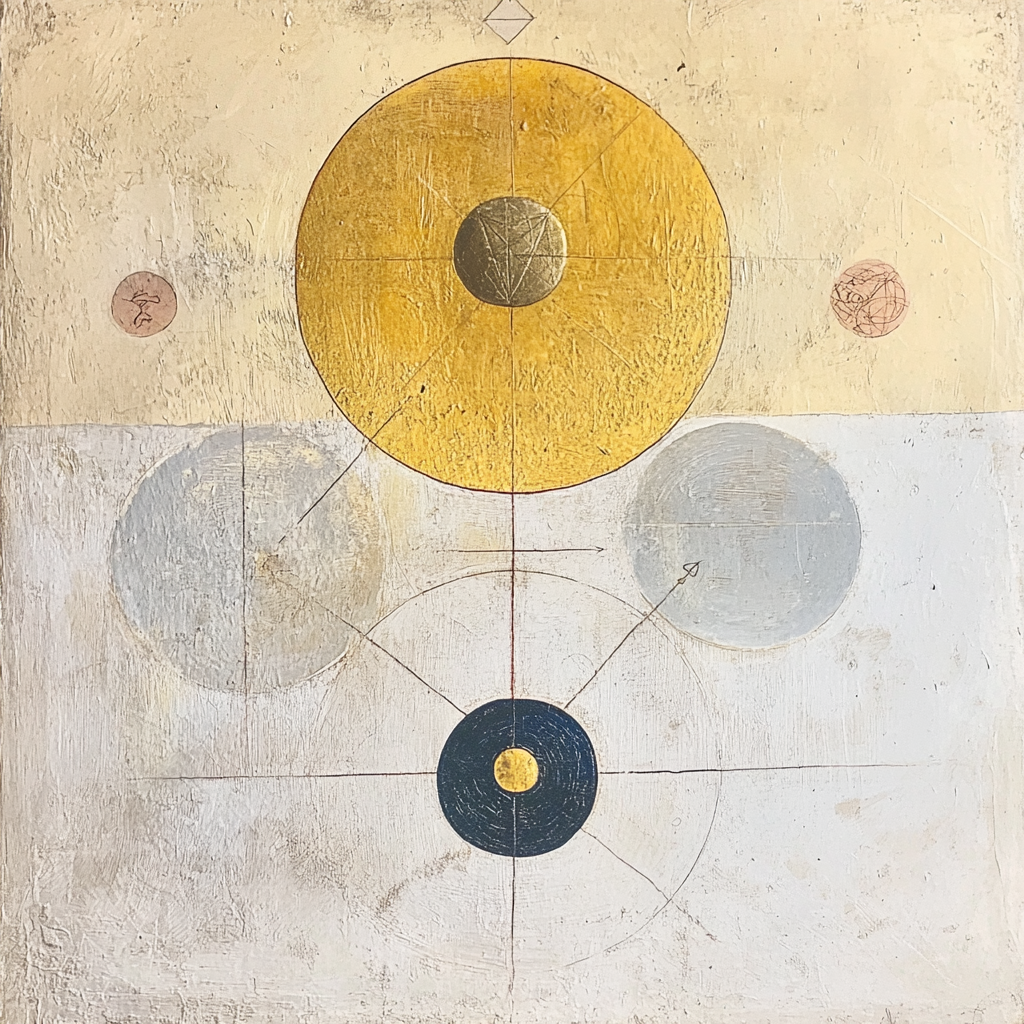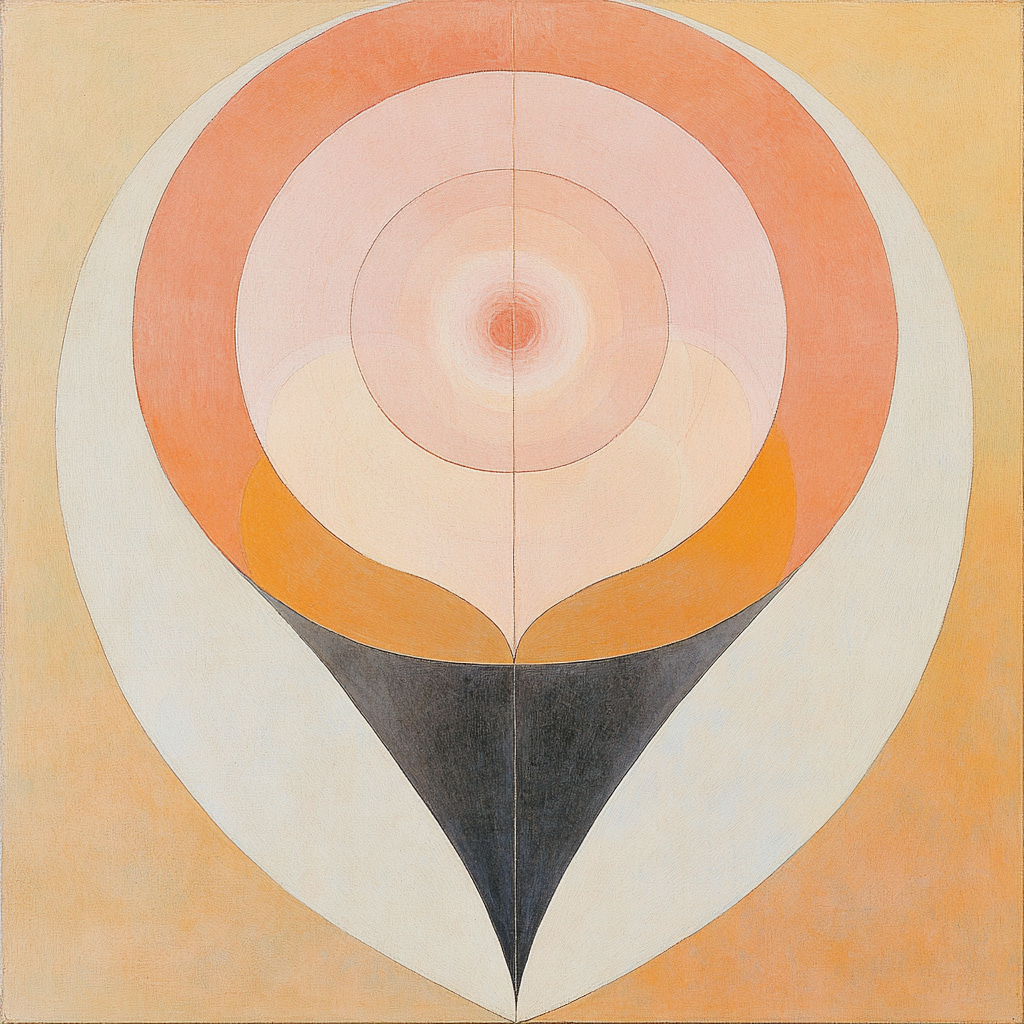The Emperor Tarot Card Meaning: He symbolizes authority and structure.
In what areas of your life can you bring more order? How can discipline help you achieve your goals?
The Emperor Tarot Card Meaning: The Stable, Orderly Father
The Emperor card stands as a powerful emblem of authority, structure, and wisdom. As the fourth card in the Major Arcana, it embodies the archetypal father figure, exuding a sense of stability and order. The Emperor’s presence in a reading invites you to examine the areas in your life where you need to assert control and bring about a disciplined approach.
The Emperor Tarot Card Meaning: Authority and Leadership
Traditionally, The Emperor represents a figure of authority and leadership. His presence suggests a time for cultivating a structured environment, whether in personal or professional spheres. This card encourages you to establish clear boundaries and set firm foundations, ensuring that your efforts are grounded and sustainable. Through The Emperor, the tarot asks you to reflect on your relationship with authority, both in terms of how you wield it and how you respond to it from others.
The Emperor Tarot Card Meaning: Stability and Solidity
The Emperor’s number, Four, is symbolic of stability and order. Envision the solidity of a square, with its four equal sides, representing balance and structure. This card often appears when you are in need of discipline and a systematic approach to achieve your ambitions. It prompts you to embody the qualities of a wise leader, making decisive actions that are rooted in logic and clarity.
The Emperor Tarot Card Meaning: The Persona Archetype
In a Jungian context, The Emperor can be seen as the embodiment of the persona archetype, representing the roles and responsibilities we assume in the outer world. It challenges you to reflect on the masks you wear and the expectations you navigate in societal roles. The Emperor’s call is to align your external persona with your inner truths, creating a harmonious balance between your inner world and the external demands.
Journal prompts for reflective work on The Emperor
- In what aspects of your life do you feel called to step into a leadership role?
- How do you currently perceive authority figures, and how might this perception affect your approach to authority?
- Reflect on a time when structure and discipline helped you achieve a goal. How can you apply similar strategies now?
- Consider the persona you project in different areas of your life. How aligned is it with your true self?
- What boundaries do you need to establish or reinforce to create a more stable environment?
- By engaging with these journal prompts, you invite The Emperor’s energy into your practice, fostering a deeper connection to the qualities of authority, structure, and wisdom in your own life.
A Simple and Free Tarot Journaling App?
❤️❤️❤️ Yes! ❤️❤️❤️
Sign up now for our Beta!
The Emperor meaning reversed
Keywords: lack of control, rigidity, domination, inflexibility, rebellion, tyranny, absence of discipline.
When control turns to chaos
The reversed Emperor card speaks to the imbalance caused by a lack of control and structure, which can manifest as chaos in one’s life. When The Emperor tarot reversed appears, it invites you to question where discipline has faltered or where rigidity has replaced healthy boundaries. Reflect on areas in your life where you might be feeling powerless or overpowered. Are you allowing chaos to dictate your actions, or are you imposing too much control, stifling creativity and freedom?
The burden of domination
In its reversed position, The Emperor may highlight issues of domination and authoritarianism. This can represent either an external force in your life or an internal tendency to impose excessive control over your own circumstances. Consider how this card reflects your current relationships and environments. Are there dynamics of power and control that need to be addressed? When examining The Emperor tarot reversed, explore your own role in these dynamics, and consider how you can move towards more balanced and fair interactions.
Inflexibility and its impact
The Emperor reversed can signify a period where inflexibility hinders personal growth. This rigidity often stems from fear or a need to maintain a false sense of security. Ask yourself: Are you resisting change due to fear of the unknown, or are you rigidly clinging to outdated beliefs and practices? Allowing yourself to be more adaptable can lead to unexpected opportunities and growth. Engage in introspection to understand how this card mirrors your current state of openness to change and new experiences.
Rebellion against authority
The presence of The Emperor reversed may also indicate a rebellion against authority, whether externally imposed or self-imposed. This aspect of the card invites you to reflect on your relationship with authority figures or your own authoritative self-imposed structures. Are these rebellions serving a purpose, or are they reactions to a deeper sense of frustration or inadequacy? When you encounter The Emperor tarot reversed, consider if this rebellion is constructive or destructive, and how it aligns with your true values and intentions.
Absence of discipline and its consequences
The reversed Emperor often points to an absence of discipline, leading to disarray and stagnation. This can manifest in personal habits, work, or relationships. Reflect on the areas of your life where discipline is lacking. Are you procrastinating or avoiding responsibilities? The Emperor tarot reversed encourages you to identify where you might benefit from establishing or re-establishing a sense of order and accountability, enabling you to regain control in a healthy and productive manner.
Is The Emperor reversed a yes or a no?
When considering whether The Emperor reversed is a “yes” or “no” card, the answer leans towards “no.” This card in its reversed position typically highlights issues of instability, lack of structure, and potential for chaos, suggesting caution and a need for reassessment. The reversed Emperor encourages introspection and a reevaluation of the current situation, often indicating that the time is not yet right for proceeding. It serves as a reminder to address underlying issues before moving forward, ensuring that decisions are made from a place of clarity and balance.
The Emperor in the context of love
Keywords: authority, stability, structure, protection, responsibility.
The Emperor is a card that brings forth the energies of authority and structure, aspects that are deeply rooted in the essence of love when viewed through the lens of commitment and responsibility. In the realm of love, The Emperor symbolizes the protective role and the stability required to build a lasting partnership. This card invites you to explore how these principles manifest in your intimate relationships, and how they contribute to a deeper understanding of love.
Reflecting on authority and balance in relationships
When considering The Emperor tarot meaning in love, it becomes essential to reflect on how authority and balance coexist in your relationships. Are you, or is your partner, embodying an authoritative figure that overshadows the mutual respect and balance necessary? Consider how the dynamic of authority plays out and what adjustments might bring harmony.
Embracing the protective nature of love
The Emperor’s nature is inherently protective, suggesting that love is not only about vulnerability but also about safeguarding those you care for. How do you express this protective instinct in your relationship? Explore how this aspect of The Emperor allows you to build a nurturing environment for growth and connection.
Building stability through commitment
The Emperor’s call for stability is a reminder of the importance of a solid foundation in love. Reflect on your commitments and how they foster a secure, loving relationship. How can embracing the steadfastness of The Emperor enhance your connection and offer comfort in times of uncertainty?
The role of responsibility in love
Responsibility is a key trait embodied by The Emperor. In the context of love, this translates into taking accountability for your actions and decisions within the relationship. How do you navigate the responsibilities that come with being in a committed partnership? Consider the ways in which you can share these obligations to strengthen your bond.
Uncovering hidden aspects of control
The Emperor’s influence often brings up themes of control. It invites introspection about areas where control might be exerting too much pressure on the relationship. Are there elements of your love life that feel constrained by control? Delve into this aspect to allow more freedom and authenticity in your interactions.
The Emperor tarot meaning in love is a rich tapestry of themes surrounding authority, protection, and responsibility. By engaging with these reflections, you open the door to a more profound understanding of how these archetypal qualities shape your romantic experiences.
The Emperor in the context of family
Keywords: Authority, stability, structure, leadership, protection, influence
The Emperor, ruled by the powerful and authoritative energy of the number four, embodies the archetype of the Patriarch within the tarot’s symbolic universe. In the realm of family, this card signifies themes of leadership, structure, and the often complex dynamics of familial authority. The Emperor tarot meaning in this context invites us to explore how paternal energy and traditional roles manifest within our family lives, urging introspection into our relationships with father figures and the established structures that govern our familial interactions.
How does The Emperor influence family dynamics?
The Emperor represents authority and order within the family unit. Reflecting on this card, we might question: Who holds the power in our family? How do we respond to authority, and how does this influence our family relationships? The Emperor tarot meaning encourages us to consider the balance of power and support in our familial relationships.
What role does stability play in family thanks to The Emperor?
Stability is a cornerstone of The Emperor’s domain. In considering The Emperor tarot meaning, think about the importance of security and consistency within family life. How does stable leadership contribute to a nurturing environment? Reflect on the structures and routines that provide a sense of grounding and safety in your family.
How can The Emperor’s energy guide our family leadership style?
The Emperor’s energy is a call to embody strong, compassionate leadership within our families. Whether you are a parent, guardian, or influential member, consider how you lead your family. The Emperor tarot meaning prompts us to explore our leadership style and its impact on family unity and growth.
What shadows might The Emperor cast on family relationships?
While The Emperor represents strength and authority, it also warns against rigidity and dominance. Reflect on how The Emperor tarot meaning may manifest as control or inflexibility in family relations. Are there areas where authority might be oppressive rather than supportive? This card invites an examination of the shadows cast by patriarchal influence in our lives.
How does The Emperor encourage familial legacy and tradition?
The Emperor often points to tradition and the legacy passed down through generations. In contemplating The Emperor tarot meaning, ask yourself: What family traditions do you uphold? How do these traditions shape your identity and relationships? The Emperor guides us to honour our heritage while being open to evolving roles within the family structure.
The Emperor in the context of abundance
Summary of Keywords
Authority, stability, structure, discipline, leadership, prosperity, mastery.
Unveiling the Emperor’s Authority in Abundance
The Emperor stands as a pillar of authority and stability, embodying the archetype of the wise ruler. In the context of abundance, he represents the disciplined path to prosperity, where structure and leadership pave the way for a life rich in resources and well-being. The Emperor tarot meaning in abundance encourages us to harness inner authority and manage our personal and external resources wisely, reflecting the mastery of one’s domain.
How Does Discipline Lead to Abundance?
When considering The Emperor tarot meaning, we must delve into how discipline serves as a cornerstone for abundance. This card prompts us to reflect on our ability to maintain order in our financial and personal lives. How can we implement routines that nurture growth while still being open to the ebbs and flows of life’s unpredictability? The Emperor inspires us to build a steady foundation from which abundance can flow.
Is Your Leadership Style Inviting Prosperity?
Leadership is key to The Emperor’s identity, yet it’s essential to question how our leadership style affects the abundance we seek. Are you a nurturing leader, guiding your projects and relationships with care and support? Or do you lean towards a more rigid form of control that might stifle growth? The Emperor tarot meaning suggests that true abundance comes from leadership that empowers rather than constrains.
The Balance of Structure and Flexibility in Achieving Abundance
The Emperor invites introspection into the balance between structure and flexibility. While structure provides the necessary framework for growth, too much rigidity can stifle creativity and opportunity. How can you incorporate flexibility within your structures to invite abundance? The Emperor tarot meaning here is about finding that sweet spot where order and adaptability coexist, allowing for a dynamic, prosperous life.
Reflecting on Mastery as a Path to Abundance
Mastery is a central theme in The Emperor tarot meaning when considering abundance. It’s not merely about control over external circumstances but also mastery over oneself. How does self-discipline cultivate an environment where abundance thrives? Reflecting on this archetype, we are encouraged to embark on a journey of self-improvement and mastery, understanding that the internal landscape we cultivate directly influences the abundance we manifest in the world.
In exploring The Emperor in the context of abundance, we are guided to examine our relationship with authority, leadership, and discipline. Only through introspection and a conscious effort to align our internal and external worlds can we truly understand and embrace the abundance that The Emperor promises.
The Emperor in the context of business
Keywords: Authority, structure, discipline, leadership, control, strategy.
A call to leadership: How The Emperor’s energy shapes your business approach
When we explore the Emperor tarot card through the lens of business, it is an invitation to delve into the archetype of authority and leadership. The Emperor embodies structure and discipline, traits that are essential for any successful business endeavour. As you contemplate the card’s influence in your professional life, consider how these keywords manifest: authority, structure, discipline, leadership, and control. In a business context, The Emperor demands a strategic approach, encouraging you to harness discipline to foster stability in your professional realm.
Embracing authority: How The Emperor influences decision-making in business
The Emperor tarot meaning in business often centres around themes of authority and decision-making. Reflect on how you wield power in your professional life. Are your decisions fostering growth and stability, or do they lead to rigidity and stagnation? This card encourages you to examine your leadership style and consider how you can integrate more balance and wisdom into your decision-making processes.
Building the empire: The strategic foresight of The Emperor in business
An aspect of The Emperor tarot meaning in business is the call to strategic planning and foresight. Like building an empire, your business requires a well-structured plan and a disciplined approach to achieve long-term success. How are you planning for the future of your business? Are there areas where more structure or a clear strategy could enhance productivity and growth?
The balance of control: Reflecting on The Emperor’s lessons in business dynamics
Control is a significant theme when interpreting The Emperor tarot card, especially in a business setting. While control can lead to stability, it can also stifle creativity and innovation if not wielded mindfully. Reflect on your approach to control within your business or career. Are you providing enough space for innovation while maintaining necessary boundaries and order?
The Emperor’s wisdom: Leveraging authority for empowerment in business
Finally, consider how you can use the wisdom of The Emperor to empower not only yourself but also those around you. True leadership goes beyond exerting control; it involves inspiring and guiding others towards a shared vision. How can you embody The Emperor’s positive traits to foster an environment where both you and your colleagues thrive?
The Emperor offers a profound reflection on leadership styles, asking you to balance authority with wisdom, structure with flexibility, and control with empowerment. Embracing these insights can lead to more effective and fulfilling business practices.
The Emperor in the context of personality
Keywords: Authority, structure, discipline, control, leadership, responsibility.
The Emperor, in the context of personality, embodies the archetype of the ruler. This card represents authority, structure, and discipline, symbolizing the part of ourselves that takes charge and assumes responsibility. In the realm of tarot and Jungian psychology, The Emperor is the epitome of order and control, serving as a guiding force for personal leadership and decision-making.
Exploring the authoritative presence within
When we consider “The Emperor tarot meaning” in terms of personality, it invites us to reflect on how we embody authority in our own lives. Are we asserting our power effectively, or are we letting it slip away? This card encourages you to assess your leadership qualities and how they influence your environment. What does it mean to you to lead with integrity?
Balancing structure and spontaneity
The Emperor’s disciplined nature can sometimes overshadow the need for spontaneity and creativity. How do you balance these aspects of your personality? Reflecting on “The Emperor tarot meaning,” consider whether your structured approach enhances your life or creates rigidity. How might introducing a little unpredictability bring balance to your personal and professional realms?
Navigating control and flexibility
Control is central to The Emperor’s personality, but it is crucial to understand when to exercise it and when to let go. The card prompts introspection: Do you find yourself overly controlling situations or people? How can embracing flexibility lead to more harmonious interactions in your daily life?
Embracing responsibility with grace
Responsibility is a key theme in The Emperor’s domain. An essential aspect of understanding “The Emperor tarot meaning” is recognizing how you handle responsibility. Do you take on too much, or do you shy away from it? Reflect on how you can shoulder your duties gracefully while maintaining a sense of well-being.
Cultivating leadership through self-awareness
Leadership, as exemplified by The Emperor, requires a deep understanding of oneself. How can you lead others if you aren’t aware of your own strengths and weaknesses? This card invites you to explore your leadership style through the lens of self-awareness and introspective journaling, bridging the gap between your conscious actions and unconscious motivations.
The Emperor in the context of self-realization
Keywords: authority, structure, discipline, personal power, integration of the masculine archetype.
Embracing the authority within
The Emperor card in Tarot is a symbol of structure, authority, and control. In the realm of self-realization, this card invites us to examine how we wield our personal power. Are we embracing the authoritative aspect of our personality, or do we shy away from taking control of our destiny? The Emperor encourages us to integrate the masculine archetype, which is often associated with qualities like logic, discipline, and leadership. Reflect on how you can harness these traits to bring order and stability to your life. Delve into how these qualities manifest in your journey toward self-realization and how they shape your personal narrative.
Building a foundation for personal growth
Self-realization is deeply rooted in understanding and establishing a strong foundation for personal growth. The Emperor urges us to create a stable internal structure that supports our aspirations and goals. Consider the importance of setting boundaries and developing a disciplined approach to your endeavors. How do these elements of The Emperor tarot meaning relate to your quest for self-realization? What steps can you take to ensure that your internal framework is robust enough to support your journey?
Balancing control and flexibility
While The Emperor card signifies control and authority, self-realization requires a delicate balance between maintaining control and being adaptable. Reflect on areas in your life where you might be too rigid or too lenient. How does this balance, or lack thereof, impact your path to self-realization? Explore ways to blend the structured energy of The Emperor with the fluidity needed for growth and transformation. Consider how being open to change can enhance your understanding of The Emperor tarot meaning.
The role of discipline in self-realization
Discipline is a key component of The Emperor’s message in the context of self-realization. It involves committing to practices and habits that align with your deeper goals and values. Reflect on how discipline manifests in your life currently. How does this concept from The Emperor tarot meaning influence your journey to self-realization? Are there areas where you could benefit from more structure and consistency? Consider how cultivating discipline can propel you toward realizing your fullest potential.
Integrating the masculine and feminine energies
The Emperor often represents the masculine energy within the tarot archetypes. Yet, true self-realization involves integrating both masculine and feminine energies within oneself. Reflect on how The Emperor’s characteristics interplay with the more receptive, intuitive aspects of the feminine. How can this integration enhance your understanding of The Emperor tarot meaning and aid in your journey of self-discovery? Explore ways to harmonize these energies to create a more balanced and fulfilled sense of self.
Symbolism Found in The Emperor
The Emperor card in the Rider-Waite deck is rich with symbolism.
Symbolism: The Emperor Himself
He is depicted sitting on a throne adorned with ram heads, a nod to Aries, the astrological sign associated with this card. Aries, ruled by Mars, embodies the traits of leadership, courage, and assertive action. The ram heads signify determination and pioneering spirit, urging you to take charge of your own life path.
Symbolism: The Ankh, The Orb and The Armor
In the card, The Emperor holds an ankh in his right hand, symbolizing life and eternal rulership. The orb in his left hand represents the world, illustrating his dominion and responsibility over his realm. Clad in armor beneath his robes, The Emperor is prepared for battle, yet remains composed, illustrating the balance between strength and calm authority.
Symbolism: The Bare Mountains
The barren mountains in the background signify resilience and the ability to thrive in harsh conditions. This imagery invites you to cultivate perseverance and steadfastness, reminding you that true leadership often involves overcoming challenges with grace and determination.
